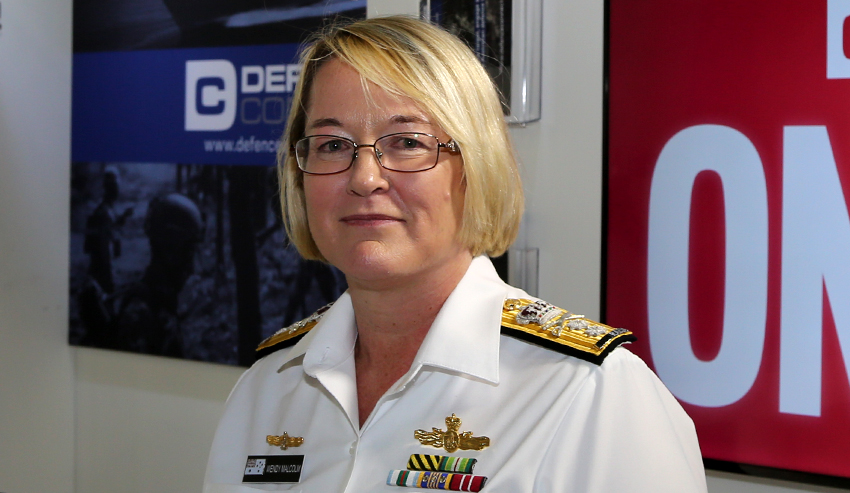Despite the turmoil and disruption of COVID-19, keeping the individual branches of the ADF ready to meet the requirements expected by government and the Australian public remains a top priority. For the Royal Australian Navy, the synergies and collaboration between defence industry and Defence are critical to implementing Plan Galileo, explains Rear Admiral Wendy Malcolm.
In what seems like just a few short weeks, our world has been turned upside down by the spread of COVID-19. Every sector of society has been affected in some way. Yet, while the virus cuts a swathe through the economy, we are witnessing a national effort akin to that during World War II.
Our governments are working together to see the country through this crisis, with every Australian called on to do their bit, even if that simply means skipping the beach and staying in to watch TV.
For others, it means ensuring the industries and businesses that provide a livelihood for Australians and help to defend our national interests are able to make it through to the other side.
Federal and state governments are contributing, pumping billions of dollars into the economy to keep businesses alive. For Navy, that means ensuring we can provide certainty and work for industry; we will need them to continue doing what they do — helping our Navy to fight and win at sea.
While our current enemy may be a virus, other challenges in our region remain and are not going to disappear as a result of COVID-19. That means the Australian Defence Force will need to continue doing the job it is currently doing.
We will need to ensure our ability to patrol the Indo-Pacific region continues uninterrupted. We will need to continue stepping up in the Pacific. Our allies will still need us to stand by our commitments to them. Our naval capability to do this is being reinforced by the Government’s multi-billion-dollar continuous Naval Shipbuilding Plan.
This will give us a shipbuilding capability we have not seen since World War II by increasing the size and complexity of our fleet by up to 50 per cent over the next two decades.
In order to ensure that Australia’s naval capability is working as well as it possibly can, and is able to be deployed when and where it is needed, we have rethought our approach to sustaining our naval vessels.
This is Plan Galileo.
At its heart, Plan Galileo is matching our continuous naval shipbuilding capability with a continuous sustainment capability. It rethinks sustainment by considering it as part of a vessel’s design process. What that means on a practical level is that defence industry contractors will know what Navy’s sustainment needs are before a keel is laid.
That gives them certainty in their investments and skilling. It also allows us to line up work from further out.
In many ways, Plan Galileo is more relevant now than in the world that existed prior to COVID-19. It provides a scalable set of work packages for industry delivered over a long time frame. It also helps our regions, since a core component of the concept is what we have called Regional Maintenance Centres.
These are self-contained sustainment centres at strategic ports comprising Defence, primes and SMEs that will be able to sustain any vessel and then return it to sea. These centres are currently planned for Cairns, Perth, Darwin and Sydney.
While Plan Galileo is a long-term project out to 2025, we are already implementing a number of its elements as a “proof of concept” within our Arafura Class offshore patrol vessel (OPV) program. Defence will test ideas, learn from our mistakes — and our successes — and work these into the overall plan as it is rolled out on a national scale.
Of course, all of this requires early and regular engagement with industry in order to communicate our needs, and for us to understand their capabilities and expectations. Obviously, face-to-face engagement has been postponed for now, but that does not mean our need to engage with industry has ended.
In fact, we need it now more than ever. The current environment is providing a useful stress test of our engagement methods and forcing us to innovate when it comes to communicating with our industry partners. Lessons learned from this will hold us in good stead when we face other, non-viral disruptions.
For example, the Regional Maintenance Centres in Cairns and Perth will need to be in place by 2022 in order to support the first OPV. In order to meet this tight deadline, we are pushing ahead with the scheduled program of works.
Plan Galileo is a long-term commitment to our naval sustainment that matches our commitment to shipbuilding. It will provide certainty and longevity in our regions and better embed Navy as a good corporate citizen, while ensuring our Navy can do the job it is called on it to do.
Rear Admiral Wendy Malcolm CSM, is currently serving as Head Maritime Systems, Capability Acquisition and Sustainment Group, Department of Defence.









